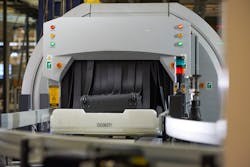First Tote-Based Baggage Handling System Goes Live in the U.S. with CrisBag at San Francisco Airport
Beumer Group has installed the first tote-based Independent Carrier System (ICS) to go live in the US.
The installation of the CrisBag ICS in the new Harvey Milk Terminal 1, confirms San Francisco Airport (SFO) as a trendsetter for airports in the U.S. The ICS baggage handling system is designed for shared airline use. The ICS also enables 100 percent track and trace as each bag remains in the same tote throughout the baggage handling and integrated security screening process. The integration of an Explosives Detection System (EDS) makes CrisBag the first system to be certified by the Transportation Security Administration (TSA) for in-tote baggage security screening.
The Harvey Milk Terminal 1 Project is a design build project for which SFO engaged Beumer, together with the other design build partners during the architectural programming phase. This allowed Beumer to work with stakeholders to design an optimum baggage system coordinated with the building.
The CrisBag system was installed and tested while the existing Terminal 1 remained in operation, supported by an interim baggage system installed by Beumer.
The consolidation to a shared use baggage system using CrisBag allows redundant routes to balance the load between the Computer Tomography X-Ray's (CTX). This has reduced the number to only seven security screening machines which are needed for baggage screening within the terminal. Prior to the redevelopment of Terminal 1, there were fifteen CTX machines serving several independently airline operated and owned baggage systems.
The Explosives Detection System was tested by the TSA to evaluate the tracking, throughput, imaging, false-alarm rates and sorting capabilities, as well as to test the system’s ability to detect missing, unknown and oversized bags. With 100 percent track and trace there is no loss of baggage tracking and the CrisBag system reduces manual handling at the TSA's Checked Baggage Reconciliation Area (CBRA) inspection stations. Final permission for the system to go live was given by the TSA when the Integrated Site Acceptance Test (ISAT) was received earlier this year.
The innovative layout of the CrisBag ICS has also enabled the airport to significantly reduce tug traffic. The inbound, transfer and outbound processes are handled in the CrisBag system and located in the baggage operational areas which are distributed throughout the terminal boarding area adjacent to the aircraft gates. Arrival baggage is taken via tugs from a flight and delivered to the inbound system infeed and the tug returns with the outbound baggage for a different flight. The totes from the make-up area are returned to the main terminal building carrying the arrival bags. This optimizes system operation and increases capacity by avoiding circulating empty totes.
The reduction in tug traffic benefits the airport as well as the environment. The CrisBag ICS also contributes to SFO’s other sustainability targets by minimizing the use of raw materials and reducing energy consumption during operation. This allows Beumer to support SFO’s commitment to meeting the Gold standard of the Leadership in Energy and Environmental Design (LEED) certificate.
The SFO T1 Redevelopment Program is scheduled to be completed in 2023. Meanwhile, Beumer Group has also been awarded a contract for a new baggage handling system in Terminal 3 at San Francisco International Airport that will mirror the system in Terminal 1.




